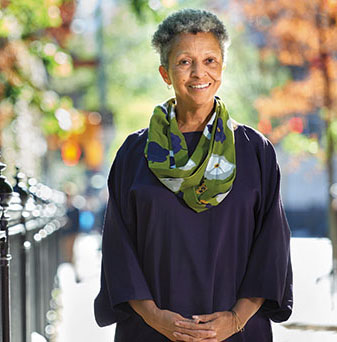Date Added:
Edited

Peggy Cooper Davis is considered one of the three most influential people in legal education according to National Jurist Magazine. Her work has impacted child welfare, constitutional rights of family liberty, and interdisciplinary analysis of legal pedagogy and process. Born in Hamilton, Ohio on February 19, 1943, she is the daughter of Margarett Gillespie Cooper, a librarian and genealogist, and George Clinton Cooper, who was one of the first African American officers in the US Navy. Davis was married to Gordon J. Davis, and had one daughter, Elizabeth Cooper Davis. She graduated from high school in 1960, earned a BA in philosophy from Western College for Women in 1964, and earned a JD degree from Harvard Law School in 1968. Davis began her career at the Community Action for Legal Services in New York, later became an associate at Poletti Freidin Prashker Feldman & Gartner, and worked as a clerk at the Federal District Court under Judge Robert L. Carter. She attended the New York Society of Freudian Psychologists, graduating in 1973. Following her graduation, Davis became associate counsel for the Capital Punishment Project, an initiative begun by the NAACP Legal Defense and Education. She became the first African American female professor at Rutgers University School of Law in 1977, teaching criminal procedure and civil rights law. Davis worked as the deputy criminal justice coordinator for the City of New York in 1978, before serving as judge of the Family Court of the State of New York from 1980 to 1983. In September of 1983, Davis joined the New York University School of Law faculty, where she taught lawyering, evidence, and family law. In 1986, she obtained a full-time professorship, and was named the John S. R. Shad Professor of Lawyering and Ethics at New York University School of Law in 1992. Davis also served as director of The Lawyering Program at New York University School of Law from 1998 to 2010, when she became director of the Experiential Learning Lab, which provided first-year students the opportunity to execute a legal strategy by drafting documents, interviewing witnesses and clients, and engaging in negotiation, mediation, and litigation. She served on the board of directors of the Equal Justice Initiative, the Brennan Center for Justice, the Balm Foundation, the Vera Institute of Justice, the Northside Center for Child Development, and the Russell Sage Foundation. In 2008, she received the Distinguished Teaching Award from New York University. In 1977 Davis authored Neglected Stories: The Constitution and Family Values, which illuminates the importance of anti-slavery traditions as guides to the meaning of the Fourteenth Amendment. Written with her daughter Elizabeth in 2011, the book Enacting Pleasure: Artists and Scholars Respond to Carol Gilligan’s Map of Love, is a collection of essays exploring the social, cultural, psychological, and political implications of Carol Gilligan’s relational psychology. She has also published more than 50 articles and book chapters, most notably in the premier journals of Harvard, Yale, NYU, and Michigan law schools.
Share your thoughts on this story with us. Your comments will not be made public.
Email
Copyright ©2016 - Design By Bureau Blank